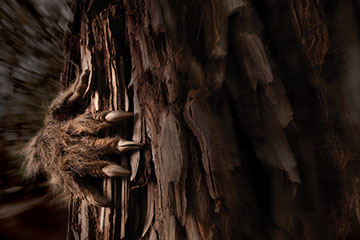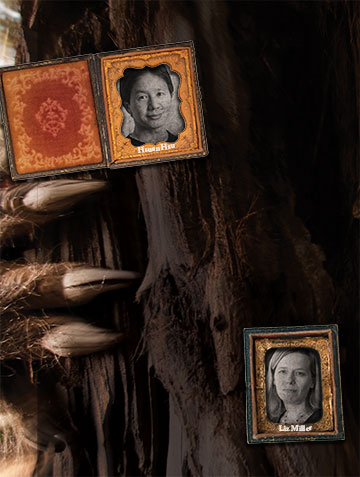Volume 32 · Number 2 · Spring 2015
Still alive
How horror lit is popularizing English
The living dead walked the basement of Wellman Hall this past winter, lurched into a lecture hall and took up residence, for at least a quarter, in the minds of 125 undergraduates.

(Gregory Urquiaga/UC Davis)
South of the Quad in the Chemistry Building, “Cthulhu” and other alien creatures awoke from their deathlike slumber winter quarter to haunt a class of 33 juniors and seniors. This spring quarter, in a classroom down the hall, students are following closely as a young wizard plays Quidditch, battles Death Eaters and thwarts the Dark Lord’s quest for eternal life.
Zombies and other supernatural beings invaded the English curriculum this year — with popular new courses like the introductory literature class “Almost Human: Animals, Cyborgs, Zombies” and an upper-division course on the works of horror fiction legend H.P. Lovecraft.
And Harry Potter found a place among Peter Pan, Alice, Willie Wonka and other classic characters who make regular appearances in an enduring course on children’s literature.
To be sure, classics like Shakespeare, Chaucer and Milton still form pillars of English studies at UC Davis. But the undead and other supernatural tales are breathing new life into the English program, stanching a trend that humanities lovers find truly scary: dropping enrollments.
A Ph.D. in zombies
While tales of horrific creatures lure undergraduates into literature classes, a romantic literary masterpiece led alumna Sarah Juliet Lauro to the walking dead.
The national decline in English studies is blamed in part on the recession and students shifting to business-related majors like economics to bolster their post-graduation chances of finding jobs. Professors also point to changes in general education requirements that allow students to get writing credit for courses taught in other departments.
UC Davis has seen a modest dip in English majors — slipping 12 percent over a five-year period from 692 in 2008–09 to 607 in 2012–13, according to English Chair Liz Miller. Last academic year saw a slight rebound to 619.
Nationwide, the number of English undergraduate degrees dropped from 55,518 in 2009 to 52,489 in 2013, according to data compiled by the Modern Language Association. That is about a 5.5 percent decline over the five-year period.
The shift away from English studies may not be a wise career move for students, Miller said: “The funny thing is that recent studies have actually shown that English majors do fairly well on the job market, compared to other undergraduate majors.”
UC Davis English alumni can be found in a wide array of fields, including journalism, the tech industry, law, the nonprofit sector, teaching, marketing, counseling and medicine.
“English majors have been trained to read, write and communicate, and our classes emphasize and prioritize critical thinking,” Miller said. “As it turns out, those are useful skills for any number of possible careers, and employers know that.”
Professor Scott Shershow said the decline in English studies may reflect other societal changes as well.
A course he teaches on modern drama has room for 60 students, but for the past two years has enrolled about one-third that number. “I don’t think most of our students have a great deal of experience with live theater,” he said.
On the other hand, the course he introduced this year on Lovecraft’s horror fiction quickly filled at 30 students, with three more admitted from a wait list.
The horror and other new courses are hardly no-brainers.
In reading Lovecraft’s stories, students analyzed the author’s racist views, as well as his themes of science, antiquities and portrayal of a cold, indifferent cosmos. “The ultimate horror [in Lovecraft’s fiction] is that we live in a universe that is so big that we are utterly insignificant,” Shershow said. “In the end, the stories undercut the author’s own racism.”
In one class session of “Almost Human,” Associate Professor Hsuan Hsu asked students to compare slave narratives in Jack London’s The Call of the Wild and Frederick Douglass’ memoir. Turning to the graphic novel Maus, the class discussed why cartoonist Art Spiegelman used different animal species to tell his father’s Holocaust survival story.

(Photos by Gregory Urquiaga and Karin Higgins/UC Davis)
As the syllabus explains, stories about monsters, aliens, animals, slaves, zombies, mice and androids are fundamentally about what it means to be human.
And, in studying texts spanning two centuries, students also got an overview of different forms of fiction as well as lessons in posing questions, analyzing and making arguments about literary fiction.
“I love it,” said Emma Askea, a first-year English major from Chico. “I like what we talk about, how the things we read are from all different time periods.”
Hsu said he has covered a number of the same texts in other courses — slavery narrative in a 19th century literature survey, a cyborg novel in literature of cities, and The Call of the Wild in a class on literature and the environment.
“While I was thinking about the connections between these texts, I was also brainstorming about how I could design a course that would have broad appeal for undergraduates at the lower division while still covering and connecting complex topics such as slavery, genocide and bioethics. The course really crystallized for me when I read and circled the phrase ‘almost human’ in Paolo Bacigalupi’s novel The Windup Girl — I remember thinking, ‘That would be a great title for a course!’”
The course proved popular with English majors and nonmajors alike (with about one-third of the students coming from other programs).
In addition to horror literature, new courses this year include “Video Games and Culture” and a lower-division introduction to Shakespeare. And the children’s literature course, offered for at least 20 years and taught by Miller this spring, includes Harry Potter and the Sorcerer’s Stone.
A new interdisciplinary minor being developed in environmental humanities could draw more students from the environmental sciences to take literature courses.
Even in the new courses, the literary classics still get their due. While one new offering for 2015–16 is “Fantasy Literature,” others will focus on two authors’ enduring influence on popular culture: Jane Austen (whose Pride and Prejudice has been parodied in a zombie novel) and that playwright who centuries ago worked a few monsters and ghouls into his scripts — the Bard.
